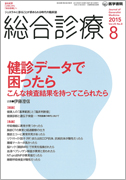1)一瀬雅夫,他:ペプシノゲンによる胃癌検診.内科 85(2): 311-316, 2000.<ペプシノゲンによる胃癌検診の基本事項をまとめた総説>
2)Miki K, Ichinose M, et al:Serum pepsinogens as a screening test of extensive chronic gastritis. Gastroenterol Jpn 22(2):133-141, 1987.
3)Yanaoka K, et al : Cancer high-risk subjects identified by serum pepsinogen tests─outcomes after 10-year follow-up in asymptomatic middle-aged males. Cancer Epidemiol Biomarkers Prev 17(4) : 838-845, 2008.<血清ペプシノゲンによる判定で分類した各集団の胃癌発生に関する10年間の長期経過を検討した現時点で唯一の論文>
4)Watanabe M, et al : Development of gastric cancer in non-atrophic stomach with highly active inflammation identified by serum levels of pepsinogen and Helicobacter pylori antibody together with endoscopic rugal hyperplastic gastritis. Int J Cancer 131(11):2632-2642, 2012.<血清ペプシノゲン陰性で同定される軽度萎縮性胃炎群に未分化癌のハイリスクが存在することを示した論文>
5)前北隆雄,他:血清ペプシノゲンによる萎縮性胃炎診断の問題点.一瀬雅夫(編)胃癌リスクファクターとリスク診断.pp121-127, 日本メディカルセンター,2014.<血清ペプシノゲンによる萎縮性胃炎診断の問題点を解説した総説>
6)Ohata H, et al : Progression of chronic atrophic gastritis associated with Helicobacter pylori infection increases risk of gastric cancer. Int J Cancer 109(1): 138-143, 2004.<“ABC検診”などリスク検診の基本理論の基礎となる報告>
7)Takechi Y, Jun Kato, et al : Cancer development based on chronic active gastritis and resulting gastric atrophy as assessed by serum levels of pepsinogen and Helicobacter pylori antibody titer. Int J Cancer 134(6) : 1445-1457, 2014.

